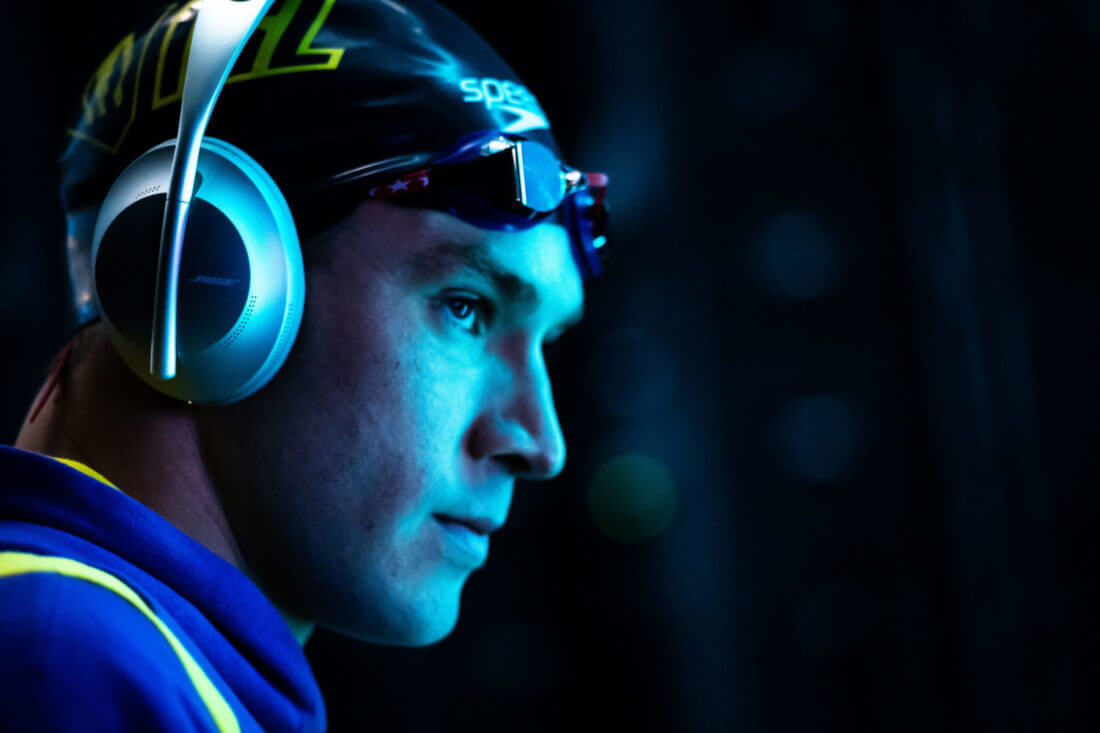Does Music Matter? How Tunes Affect Swimmers Before a Race
Sweat dripping down your face. Arms and legs pulsating with nervous energy. The thumping heartbeat beating through your chest.
Pre-race stress is incredibly common among swimmers. There are many ways athletes look to handle internal pressures, all depending on the individual. But a method that’s become almost universal is music.
A trip to any swim meet will lead to the sight of hundreds of athletes, immersed in their headphones as they prepare for their races. A study by the University of Missouri back in 2003 estimated that 94% of athletes utilized music before engaging in competition, a number which has surely only grown in the cell phone era. But are the pre-race jam sessions effective for swimmers? Or can they actually be detrimental to performance?
Music for Pre-Race Motivation
Music can be utilized in many different ways before racing, and for a variety of different reasons. Dr. Michelle Cleere, a sports psychologist who has experience working with Cal’s swim team, says the use of music at a swim meet depends on a swimmer’s personality.
“Music is often part of what we call a ‘performance routine,’” Cleere said. “This is how you get mentally warmed up, so it comes down to what specific headspace the swimmer wants to be in.”
One of the most common headspaces is often the desire for inspiration before a race. Some of the world’s best athletes utilize music to drive them to success, like Lilly King’s powerful pop tunes back in 2017.
According to the research, this method can have a positive impact on success, especially before a race. Research by Smirnaul (et. al.) for The Journal of Sports Medicine and Physical Fitness showed that listening to five minutes of music, selected by the participants, led to increased performance in a time trial of the 200 freestyle. The study showed that the music created an “increased motivation, or decreased perception of effort,” making the athletes more successful.
A key factor in how well motivation works for athletes could be the intensity of the music, however. As Cleere pointed out, it can be difficult for athletes to succeed when utilizing intense music before a race, even if it increases motivation.
“There’s not a lot of swimmers who want that big-time intensity before a race,” Cleere said. “There’s nerves, your heart rate is beating, your head’s pounding… most people don’t want more of that.”
Comfort Is Key
The antithesis to utilizing music to produce energy before a race is using it to soothe. Numerous competitors prefer to feel at their most comfortable before they dive into the water. Swimmers like “Dancing Queen” Sierra Schmidt have used music to relax themselves behind the blocks, finding the tunes that make them feel the most at home.
Research done for the University of Trento in Italy by Matteo Chies and Claudio Mulatti tells us that the usage of music could potentially allow swimmers a relief from their pre-race anxiety. The researchers say that the music could aid athletes in reaching a “flow-state,” a place of deep immersion into a sport or activity. The athletes can block out the external “noise” surrounding them by falling deep into the place of comfort.
Cleere pointed to this method as the most common usage of music before racing.
“Most of us love music; it makes us feel really good,” said Cleere. “It’s something that can distract us, and help us find a more centered space.”
How to Find The Best Music For You
Swimmers can utilize music before a race in two very different ways. But how should a swimmer decide which type of music to listen to? To Cleere, it’s a simple process.
“I usually ask my swimmers to think about the last couple of races where they did well,” Cleere said. “What headspace were you in before those races? And that’s usually pretty revealing.”
“Performance routines” are different for every swimmer, according to Cleere. But by working to discover what works best for an athlete individually, they can work toward effective performance.
“It can really set the stage for what an athlete wants to happen, before they race,” Cleere said. “There’s a lot of work that goes into this (mental headspace of a swimmer), but music can always be a factor.”
